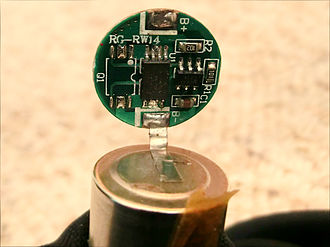Rechargeable battery






Rechargeable battery refers to a type of electrical battery which can be charged, discharged into a load, and recharged many times, as opposed to a disposable battery, which is supplied fully charged and discarded after use. It is composed of one or more electrochemical cells. The term "accumulator" is also used, as it accumulates and stores energy through a reversible electrochemical reaction. Rechargeable batteries come in many different shapes, sizes, and chemistries, including lead-acid, nickel-cadmium (NiCd), nickel-metal hydride (NiMH), lithium-ion (Li-ion), and lithium polymer (LiPo).
Types of Rechargeable Batteries[edit]
Each type of rechargeable battery has its own advantages and disadvantages, which makes them suitable for specific applications.
Lead-Acid[edit]
The lead-acid battery is one of the oldest types of rechargeable batteries. It has a high power-to-weight ratio, making it a good choice for automotive starters. However, it is heavy and has a poor energy-to-weight ratio.
Nickel-Cadmium[edit]
Nickel-cadmium (NiCd) batteries have a long life and can perform well at low temperatures. They are used in a variety of applications from power tools to aerospace. However, they suffer from the memory effect and contain toxic heavy metals.
Nickel-Metal Hydride[edit]
Nickel-metal hydride (NiMH) batteries have a higher energy density compared to NiCd batteries and do not suffer from the memory effect. They are used in many consumer electronics devices.
Lithium-Ion[edit]
Lithium-ion (Li-ion) batteries have a high energy density and a low self-discharge rate. They are widely used in portable electronics, electric vehicles, and aerospace applications. However, they can pose safety risks if damaged or improperly handled.
Lithium Polymer[edit]
Lithium polymer (LiPo) batteries offer the benefits of lithium-ion in a flexible, ultra-thin format. They are often used in mobile devices and radio-controlled vehicles.
Advantages and Disadvantages[edit]
Rechargeable batteries have several advantages over disposable ones, including cost savings over time, reduced environmental impact, and convenience. However, they also have disadvantages such as the initial cost, the need for a charger, and the potential for reduced capacity over time due to the degradation of their components.
Applications[edit]
Rechargeable batteries are used in a wide range of applications, from consumer electronics like smartphones and laptops to large-scale energy storage systems for renewable energy sources. They are also critical in the development of electric vehicles, which rely on high-capacity, rechargeable batteries.
Environmental Impact[edit]
The environmental impact of rechargeable batteries is significantly lower than that of disposable batteries, but it is not negligible. The production and recycling of rechargeable batteries consume resources and release pollutants. Proper recycling and disposal of rechargeable batteries are essential to minimize their environmental footprint.
See Also[edit]
Ad. Transform your life with W8MD's Budget GLP-1 injections from $75


W8MD offers a medical weight loss program to lose weight in Philadelphia. Our physician-supervised medical weight loss provides:
- Weight loss injections in NYC (generic and brand names):
- Zepbound / Mounjaro, Wegovy / Ozempic, Saxenda
- Most insurances accepted or discounted self-pay rates. We will obtain insurance prior authorizations if needed.
- Generic GLP1 weight loss injections from $75 for the starting dose.
- Also offer prescription weight loss medications including Phentermine, Qsymia, Diethylpropion, Contrave etc.
NYC weight loss doctor appointmentsNYC weight loss doctor appointments
Start your NYC weight loss journey today at our NYC medical weight loss and Philadelphia medical weight loss clinics.
- Call 718-946-5500 to lose weight in NYC or for medical weight loss in Philadelphia 215-676-2334.
- Tags:NYC medical weight loss, Philadelphia lose weight Zepbound NYC, Budget GLP1 weight loss injections, Wegovy Philadelphia, Wegovy NYC, Philadelphia medical weight loss, Brookly weight loss and Wegovy NYC
|
WikiMD's Wellness Encyclopedia |
| Let Food Be Thy Medicine Medicine Thy Food - Hippocrates |
Medical Disclaimer: WikiMD is not a substitute for professional medical advice. The information on WikiMD is provided as an information resource only, may be incorrect, outdated or misleading, and is not to be used or relied on for any diagnostic or treatment purposes. Please consult your health care provider before making any healthcare decisions or for guidance about a specific medical condition. WikiMD expressly disclaims responsibility, and shall have no liability, for any damages, loss, injury, or liability whatsoever suffered as a result of your reliance on the information contained in this site. By visiting this site you agree to the foregoing terms and conditions, which may from time to time be changed or supplemented by WikiMD. If you do not agree to the foregoing terms and conditions, you should not enter or use this site. See full disclaimer.
Credits:Most images are courtesy of Wikimedia commons, and templates, categories Wikipedia, licensed under CC BY SA or similar.
Translate this page: - East Asian
中文,
日本,
한국어,
South Asian
हिन्दी,
தமிழ்,
తెలుగు,
Urdu,
ಕನ್ನಡ,
Southeast Asian
Indonesian,
Vietnamese,
Thai,
မြန်မာဘာသာ,
বাংলা
European
español,
Deutsch,
français,
Greek,
português do Brasil,
polski,
română,
русский,
Nederlands,
norsk,
svenska,
suomi,
Italian
Middle Eastern & African
عربى,
Turkish,
Persian,
Hebrew,
Afrikaans,
isiZulu,
Kiswahili,
Other
Bulgarian,
Hungarian,
Czech,
Swedish,
മലയാളം,
मराठी,
ਪੰਜਾਬੀ,
ગુજરાતી,
Portuguese,
Ukrainian


